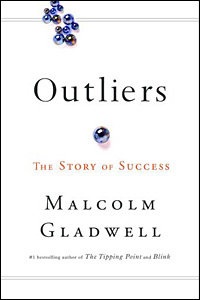Malcolm Gladwell’s Outliers—A Peppy Story of Success

“Outliers: The Story of Success” is Malcolm Gladwell’s third consecutive best-selling nonfiction book, following “Tipping Point” (2000) and “Blink” (2005) published by Little, Brown and Company on November 18, 2008.
While “Tipping Point” focuses on the individual’s ability to effect change in society, “Outliers” deals with the cultural and societal forces that give rise to opportunistic individuals. In “Outliers,” Gladwell attempts to answer the question: What makes some people successful while others cannot seem to realize their full potential?"
The world today often considers people successful when they embody certain inherent traits and characteristics like diligence, self-sacrifice, intelligence and talent. However, Gladwell contends that the conditions and circumstances surrounding our lives are the more significant influential factors that determine our success, not our inner admirable ability or talent.
Gladwell cites chance opportunities such as birth during a certain time period and demographic luckiness to be overwhelming factors in determining a person’s success. He shares the stories of many outliers who have met their potential by harnessing the chance opportunities that have come their way.
To Gladwell, the stories of pop music band The Beatles and Microsoft founder Bill Gates, for example, are distinguished not by “their extraordinary talent but their extraordinary opportunities.” The Beatles became the Beatles, he suggests, because they happened to be invited, repeatedly, to Hamburg, Germany, where they had to perform many hours an evening for many nights — practice time that enabled them to hone their craft.
Similarly, Gladwell suggests that Bill Gates became Bill Gates because he was lucky enough to attend a high school that “had access to a time-sharing terminal in 1968,” and because he had another series of opportunities to spend hours working on computer programming before dropping out of Harvard to start his own software company.
Both the Beatles and Bill Gates, Gladwell argues, exceeded or came close to what he calls “the 10,000-Hour Rule” — the number of hours of practice that a neurologist named Daniel Levitin says are likely required “to achieve the level of mastery associated with being a world-class expert — in anything.”
Also, says Gladwell, Gates had the good fortune to be born in 1955 — one of the optimum years to be born to take advantage of the personal computer age.
Some reviewers have, however, criticized Gladwell, arguing that while his claims throughout “Outliers” are firm, the logical reasoning behind these claims is faulty. Critics say that Gladwell does not discuss the methodology that informs his study, which leaves the reader questioning the validity of the case studies.
That said, Gladwell’s writing is accessible to the general public. His claims are persuasive enough to capture the reader while drawing him/her into the argument. As one review for The New York Times rightly says, "Outliers is peppy, brightly written and provocative in a buzzy sort of way."
The book, “Outliers,” is indeed thought-provoking. It will challenge you to think deeply about the nature of success in society, while also showing you that successes and failures can be explained in unexpected ways. Too often, we do not take those factors into consideration as much as we should.
Buy now: $10.20 - Amazon.com


 Malcolm Gladwell is a United Kingdom-born, Canadian-raised journalist now based in New York City. He is a former business and science writer at the Washington Post. He has been a staff writer for The New Yorker since 1996. He is best known as the author of the books "The Tipping Point: How Little Things Can Make a Big Difference" (2000), "Blink: The Power of Thinking Without Thinking" (2005), "Outliers: The Story of Success" (2008) and "David and Goliath: Underdogs, Misfits and the Art of Battling Giants" (2013).
Malcolm Gladwell is a United Kingdom-born, Canadian-raised journalist now based in New York City. He is a former business and science writer at the Washington Post. He has been a staff writer for The New Yorker since 1996. He is best known as the author of the books "The Tipping Point: How Little Things Can Make a Big Difference" (2000), "Blink: The Power of Thinking Without Thinking" (2005), "Outliers: The Story of Success" (2008) and "David and Goliath: Underdogs, Misfits and the Art of Battling Giants" (2013).















![[node:title]](/sites/default/files/styles/video_thumbnail_bottom/public/man-florida-house-sold-sign-raltors-license.jpeg?itok=1M9PrpuZ)


